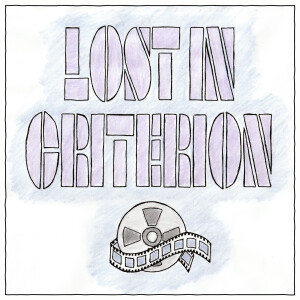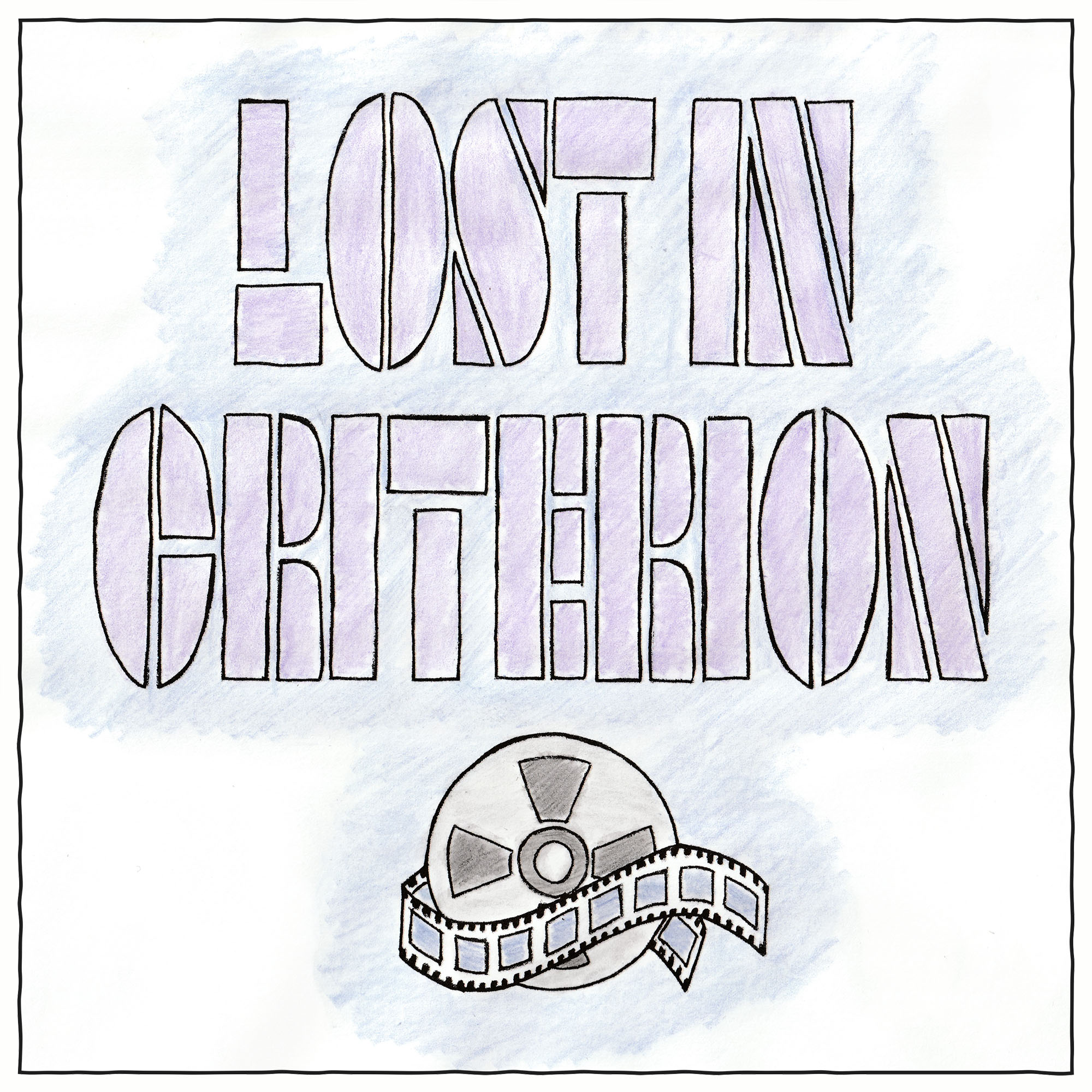Episodes

Friday Nov 18, 2016
Spine 213: Richard III
Friday Nov 18, 2016
Friday Nov 18, 2016
Laurence Olivier plays a power-hungry outsider with a distinct physical feature and speech patterns whose ascension to power allows him to imprison his political enemies and ultimately leads to war.
There are no parallels.
Just kidding. Olivier based his portrayal of the title character in Richard III (1955) on Hitler, as he'd done when he first played the role in this Shakespearean play on stage in 1944. Surely there are no new lessons to be learnt from this.
Olivier also directs and adapted, and what a job he did at each. A fantastic job. The best job. Lot's of people talking about how great a job he did.

Friday Nov 11, 2016
Spine 212: Ingmar Bergman Makes a Movie
Friday Nov 11, 2016
Friday Nov 11, 2016
In 1963 a fresh-faced Vilgot Sjoman asked Ingmar Bergman if he could watch his process, then Sveriges Television asked Sjoman if they could tag along. Of course Bergman only half said yes. The documentary is mostly true to life, and fascinating in that regard, though it's also a bit fake, with some sequences not exactly showing what they claim and at least one interview wholly reshot after Bergman didn't like the results.

Friday Nov 04, 2016
Spine 211: The Silence
Friday Nov 04, 2016
Friday Nov 04, 2016
We finish of the Three Films by Ingmar Bergman boxset next week with a documentary by Vilgot Sjoman, but the three titular films come to an end and a head this episode as we talk The Silence from 1963. While we praised the last two films for being the most straightforward Bergman films we've experienced, the third is a bit more obtuse unless the titular Silence of God is the fact that religion just isn't mentioned anymore. But it takes place at a hotel, so Adam gets to share some hotel stories!

Friday Oct 28, 2016
Spine 210: Winter Light
Friday Oct 28, 2016
Friday Oct 28, 2016
The Communicants -- the actual translation of the Swedish title for Winter Light -- are what we call people who are taking the Communion, and perhaps the solid statement, calling everyone in this film Communicants, is as much a lesson as anything in the film. Of course the other definition -- someone imparting information -- brings its own interpretations. Winter Light -- the always dim but never dying sun -- well, that's a third meaning to keep on our plate. Bergman's 1962 followup and ideological sequel to Through a Glass Darkly acts as a rebuttal to the finale of that film. But at the same time even as rites and actions are confessed to be metaphysically useless, they're still psychologically important, maybe? As people who have sailed those seas and landed on separate shores Pat and I have a lot to say this week. It starts with 10 minutes about Communion itself, though, because BERGMAN.

Friday Oct 21, 2016
Spine 209: Through a Glass Darkly
Friday Oct 21, 2016
Friday Oct 21, 2016
1961, and specifically the film Through a Glass Darkly, marked a number of changes for Ingmar Bergman: it's the first time he starts to shoot on the island of Fårö, his first time working with the great cinematographer Sven Nykvist, and, perhaps most strikingly, a brief flirtation with making philosophically straightforward film. This film and the next -- Winter Light which we'll talk about next week as we continue through the boxset Three Films by Ingmar Bergman -- are possibly the most easy to understand of Bergman's whole catalog, among the few where the filmmaker himself is doing most of the work for interpretation. This does not make them less depressing, but it does make it a good starting point for introducing yourself to the films of Ingmar Bergman.

Friday Oct 14, 2016
Spine 207: The Pornographers
Friday Oct 14, 2016
Friday Oct 14, 2016
Shohei Imamura is the only Japanese director to win the Palme d'Or at Cannes, which is probably more of an indictment against Cannes than the quality of Japanese film. Nonetheless, the award was not for The Pornographers, his first independent film made at his own production company in 1966. Imamura viewed himself as a "cultural anthropologist" and therefore wanted "to make messy films" about real people. This one may be a little too real for Pat and I. But it does give us an opportunity to revisit Ronald Neame's The Horse's Mouth, to which Imamura make a clear reference even though a Google search suggests that we are among the very few people in history to notice.

Friday Oct 07, 2016
Spine 206: The BRD Trilogy: Lola
Friday Oct 07, 2016
Friday Oct 07, 2016
Lola (1981) brings us to the end of the BRD Trilogy. It can be argued that Veronika Voss is a political film, but for Maria Braun and Lola the argument stands on surface observation. Rainer Werner Fassbinder had some interesting political beliefs, and we tackle probably his most controversial stance in this week's episode as well. Find out what he's wrong about by giving us a listen.

Friday Sep 30, 2016
Spine 205: The BRD Trilogy: Veronika Voss
Friday Sep 30, 2016
Friday Sep 30, 2016
Here at Lost in Criterion we strive to capture the organic conversation Pat and I have reacting to the films we've watched. Unfortunately, sometimes technical difficulties strike and we have to re-record. While this has only happened three times in 200 episodes -- which is frankly amazing -- the fact remains that you can't really have an organic conversation when you've already had it once. Due to Audacity inexplicably eating 10 minutes of my side of the conversation (we're still not sure how or why) you're getting take two for this week. It probably shows a little.
Veronika Voss (1982) is Rainer Werner Fassbinder's penultimate film and the second of the BRD Trilogy, though oddly enough the last film in the trilogy, Lola, was made before this one. I want to apologize for the fact that we probably spend more time talking about male lead Robert then Veronika herself, but see the paragraph above for why that happened and imagine take one where we actually talked about her. Not that it matters, we could talk for hours about either of them. Heck, we could talk for hours about the Public Health official. People in this movie are complex or weird in highly rant-able ways.

Friday Sep 23, 2016
Spine 204: The BRD Trilogy: The Marriage of Maria Braun
Friday Sep 23, 2016
Friday Sep 23, 2016
Our last encounter with Rainer Werner Fassbinder left us breathless, and now we move into a trilogy of some of the famed directors best (and final) work. All three stories feature female protagonists making their way in post-war West Germany, and all three are varying degrees of indictment against West German society as Fassbinder saw it. The Marriage of Maria Braun (1979) suggests that Fassbinder believes the BRD is about to blow itself up, but then he destroys all semblance of subtext in the final moments of the film. Even without that final hammer it's a fascinating tale.

Friday Sep 16, 2016
Spine 202: Terminal Station and Indiscretion of an American Wife
Friday Sep 16, 2016
Friday Sep 16, 2016
David O. Selznick produced The Third Man and it is the best movie. Also he produced this one. Terminal Station, his 1953 collaboration with Italian neorealist Vittorio De Sica, takes that ambivalence and splits it in two, which is appropriate: we get one movie to love and one to hate. Selznick so hated what De Sica brought him that he recut the film himself, shaving 25 minutes out and gutting it of it's emotional arc. The resulting film, Indiscretion of an American Wife, is also included on this Criterion release, so we talk both this week.

Friday Sep 09, 2016
Spine 201: Umberto D.
Friday Sep 09, 2016
Friday Sep 09, 2016
We've already talked a bit about Italian neorealism, albeit through a filmmaker who was trying to reject the movement some years after it had died. Now we get to see the film that, arguably, killed it. Vittorio De Sica is hardly a stranger to the movement -- his Bicycle Thieves, which we'll talk about in the future, is one of its masterpieces -- but that didn't stop critics from piling on the hate for Umberto D. in 1952. Unfairly, I may add, as it's a great movie. Alas.

Friday Sep 02, 2016
Spine 200: The Honeymoon Killers
Friday Sep 02, 2016
Friday Sep 02, 2016
According to Wikipedia The Honeymoon Killers is Truffaut's "favorite American film." Wikipedia cites a 1992 New York Times piece, which pops off the quote without any solid attribution. Pat digs deeper and discovers the truth for this week's episode, though you probably could have guessed that Wikipedia isn't quite on the level.
Anyway, Leonard Kastle's 1970 ultra-low-budget true crime film is one of those where we spend a good chunk of time wondering just why it's in the collection anyway. The answer may solely be that a young Martin Scorcese was originally hired to direct, shot at least one scene, then was fired for taking too much time. The end product comes off as shades of John Waters without being purposeful or self-aware. So bad it's bad, and unhelped by its shocking use of violence.

Friday Aug 26, 2016
Spine 199: Schizopolis
Friday Aug 26, 2016
Friday Aug 26, 2016
Stephen Soderbergh puts all his bad ideas into one movie.

Friday Aug 19, 2016
Spine 198: Ali: Fear Eats the Soul
Friday Aug 19, 2016
Friday Aug 19, 2016
Continuing our short trend of films with messages that coincidentally speak to some of the darkest positions of American society today, mostly because they critique aspects of human interaction that, sadly, bubble up every so often in any civilization (and almost always exist at at least a low simmer). Rainer Werner Fassbinder's Ali: Fear Eats the Soul (1974) -- our first from the renowned German -- is an homage to the melodrama of Douglas Sirk, in particular a retelling of All That Heaven Allows that takes that films class-divided love story and transfers it to a West Germany divided by class, race, religion, and immigration status.

Friday Aug 12, 2016
Spine 197: Night and Fog
Friday Aug 12, 2016
Friday Aug 12, 2016
A concentration camp is built like a Grand Hotel.
You need contractors, estimates, competitive bids
And no doubt friends in high places.
These were the lines of Night and Fog that may have hit me the hardest. Someone, some company, built the barracks, the guard towers, the ovens. And no doubt that company beat out other companies for the contract.
Alain Resnais' 1955 short documentary subtly twists the knife as the audience is called out for its part in the Holocaust (and all other holocausts) whether active or passive. Maybe you didn't place the noose around the neck, but maybe you sold the rope to the hangman, maybe you built the gallows, maybe you sat idly by because the people being led up the stairs didn't look like you.
But it's not about guilt; it's about responsibility.
When the Allies open the doors,
All the doors,
The deportees look on without understanding.
Are they free?
Will life know them again?
"I am not responsible," says the Kapo,
"I am not responsible," says the officer,
"I am not responsible."
Who is responsible then?
And it is not just a question of who is responsible for what happened, but of who is responsible for what may happen.
The skill of the Nazis is child's play today.
Someone builds the walls. Someone guards the gates. Someone fires the furnace.
Someone drops the bombs.
Someone steers the drones.
Someone writes the checks.
But also someone speaks the dehumanizing rhetoric: "they only want money", "they're all rapists and murderers," "they can't be trusted in a public restroom", "they're ruining this country."
And someone listens.
Rhetoric has consequences.
Resist being one of these someones. Do what you can to help others resist being these someones.

Friday Aug 05, 2016
Spine 196: Hiroshima mon Amour
Friday Aug 05, 2016
Friday Aug 05, 2016
The same amazing non-linear storytelling that we saw in masterful use last week kind of makes its cinematic debut here, in Alain Resnais' 1959 drama Hiroshima mon Amour. Sure, as we point out, other films had used flashback, but none in quite this way, a much more literary way to be sure (we cite To The Lighthouse, but Slaughterhouse Five is perhaps the literary codifier of the method). In any case, though, Hiroshima mon Amour's technique became THE film narrative for flashback. And we're all lucky for that.

Friday Jul 29, 2016
Spine 195: I Fidanzati
Friday Jul 29, 2016
Friday Jul 29, 2016
I know it's just Italian for "end" but I Fidanzati ending with "FINE" in white block letters on a black frame sums up my emotional response.

Friday Jul 22, 2016
Spine 194: Il Posto
Friday Jul 22, 2016
Friday Jul 22, 2016
Ermanno Olmi's films have all the hallmarks of Italian neorealism even though he claims his film style is a response to (and rejection of) Italian neorealism.

Friday Jul 15, 2016
Spine 193: Quai des Orfrevres
Friday Jul 15, 2016
Friday Jul 15, 2016
It's so rare that a perfect film could exist. How did Henri-Georges Clouzot make so many?

Friday Jul 08, 2016
Spine 192: Coup de Grâce
Friday Jul 08, 2016
Friday Jul 08, 2016
The year after their brilliant film The Lost Honour of Katharina Blum, married movie-makers Margarethe von Trotta and Volker Schlondorff split their duties with Schlondorff staying behind the camera for Coup de Grace while von Trorra does double duty as co-writer and star. Filmed in 1976 and set in 1919, the filmmakers split the difference and rather successfully made a film that seems to have been made in 1939 for all it's melodrama and technology, though with its graphic depiction of war and its emotional consequences perhaps not in America in 1939. Oh goodness the emotional consequences.

Friday Jul 01, 2016
Spine 191: Jubilee
Friday Jul 01, 2016
Friday Jul 01, 2016
Derek Jarman's Jubilee is complicated. It started life as a documentary about Jordan, a movie "about punk rock", and slowly grew into the post-apocalyptic time travel weirdly pro-Monarchy-ish critique of punk rock and British society. As an openly gay man in London in 1978, perhaps Jarman was an outsider outside other outsiders, further anti-establishment than the punk movement he saw around him. At least that's the argument I try to make against Pat and guest Donovan Hill, who really just think Jarman's thesis -- whatever it is -- doesn't land. I don't necessarily love the film, personally, but it's definitely more interesting than I think my Pat and guest Donovan Hill give it credit for. Of course I could very well be wrong -- certainly Jarman doesn't hit his critique out of the park -- but we manage a pretty great conversation about punk rock, politics, ideals, and selling out. One of my favorite episodes to record, hope you love it as much as I did.

Friday Jun 24, 2016
Spine 190: Throne of Blood
Friday Jun 24, 2016
Friday Jun 24, 2016
The best Shakespeare adaptation wonder far from the text. Donovan Hill joins us to talk about Kurosawa's Throne of Blood

Friday Jun 17, 2016
Spine 189: The White Sheik
Friday Jun 17, 2016
Friday Jun 17, 2016
Federico Fellini's first solo feature directorial The White Sheik (1952) is everything we love about the famed Italian, and very little of what we don't. The book Adam mentions in the introduction is Harriet Russell's Envelopes and is delightful as well.

Friday Jun 10, 2016
Spine 188: Love on the Run
Friday Jun 10, 2016
Friday Jun 10, 2016
The final film in Francois Truffaut's Antoine Doinel series and our boxset, 1979's Love on the Run is a capstone and a bit of a clip show, editing in flashbacks not just to the previous four films, but recontextualizing other Jean-Pierre Leaud films in order to add more backstory. Pat isn't necessarily impressed, but that doesn't stop us from fantasizing about what this film would have been like if it was made, say, last year, with the rest of Leaud's career to pull from.

Friday Jun 03, 2016
Spine 187: Bed and Board
Friday Jun 03, 2016
Friday Jun 03, 2016
We next meet Antoine Doinel in 1970's Bed and Board. This time director Francois Truffaut has his character slightly more married but just as restless as ever before. Unfortunately, this manifests in some pretty demeaning tropes about Asian women in general, and Japanese women in particular. C'est la vie, as the French say, but perhaps more apropos: C'est la vie quand vous comptez sur les stéréotypes raciaux.

